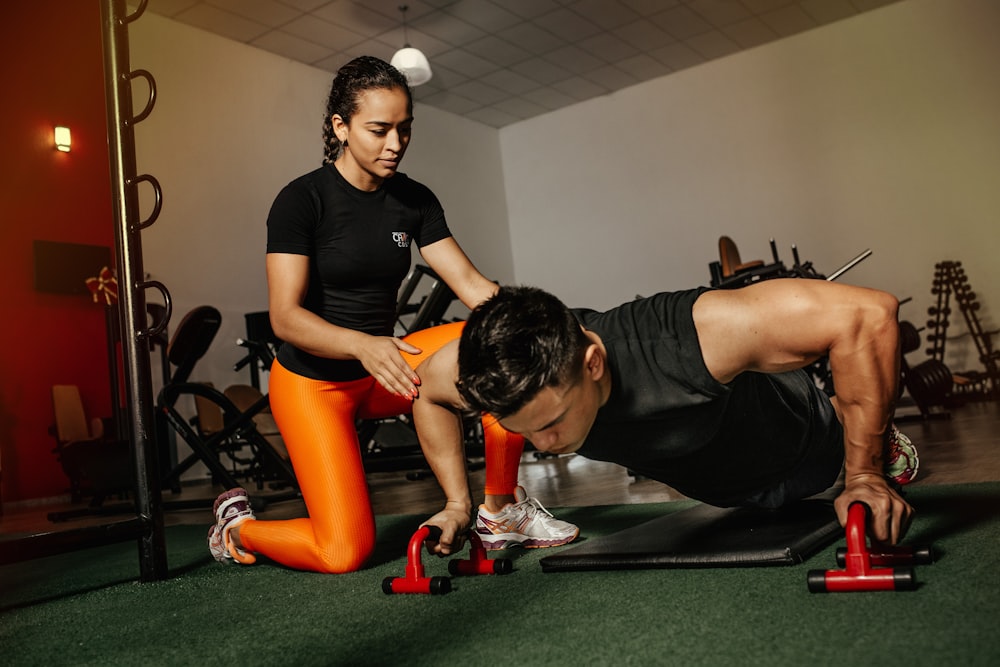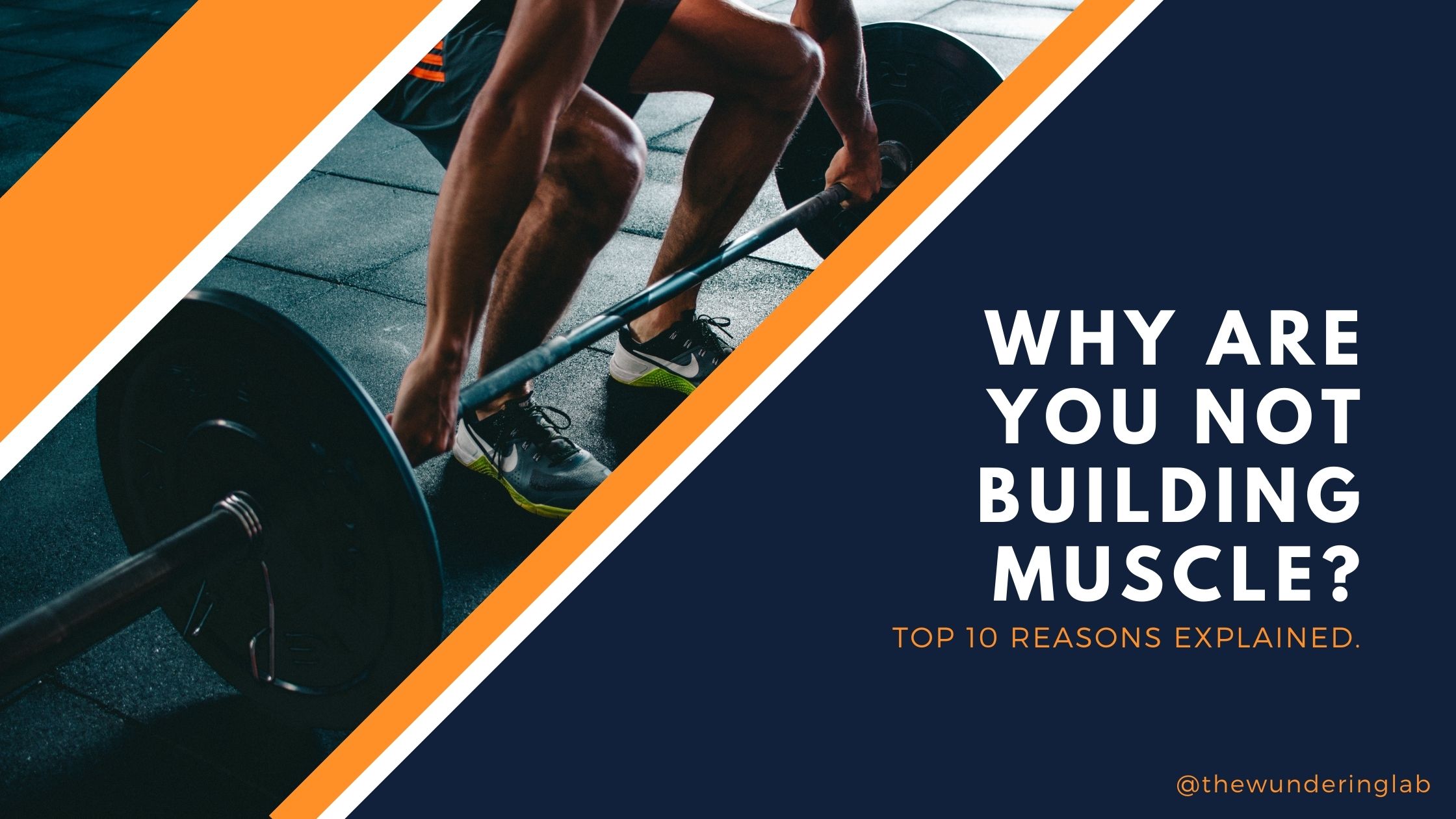
Many people head to the gym thinking with just strength training, building muscle and becoming leaner is a given. When they don’t see the results, they think it’s not working and quit.
Change is the only constant!
Not seeing results can be very frustrating, but packing on muscle is no easy feat!
- I’m no expert in fitness or nutrition, and what works for me may not work for you.
- 1. You are not eating enough!
- How do I know how many calories my body needs?
- 2. What are you eating and drinking?
- 3. Too much cardio!
- 4. Are you getting enough sleep?
- 5. Too much stress?
- 6. Do you have a training log?
- 7. Right moves at the wrong time.
- 8. Are your workouts progressive?
- 9. How about your techniques and forms?
- 10. Are your workouts balanced?
I’m no expert in fitness or nutrition, and what works for me may not work for you.
But here are the top 10 reasons why people are generally not building the muscle they want!
- Not enough fuel & calories
- Nutrition & Diet
- Too much Cardio
- Lack of Rest
- Stressed from work?
- Training structure
- How’s your gym plan like?
- Have your workouts been stagnant?
- Are your techniques & form correct?
- Are your workouts balanced?

1. You are not eating enough!
Your body requires a certain amount of calories to maintain your current weight. This varies for everyone depending on your age, level of activity, height, etc.
If your calorie intake is lower than your basal metabolic rate (BMR), then you’ll lose weight. This is commonly known as a calorie deficit and vice versa, a calorie surplus means you’ll gain weight.
How do I know how many calories my body needs?
I’ll link a BMR calculator that is relatively helpful in determining your daily calorie requirements.
If your goal is to build muscle, you’ll need to put on weight! In this sense, your calorie intake needs to be more than your expenditure.
A rough guide would be to add 500 to the number you obtained from the BMR calculator. This number is a rough indication of how many calories you should be consuming daily to gain weight and aid in building muscle!
For example (Daily caloric consumption):
- As indicated by the BMR calculator = 1,800 calories
- For weight loss: 1,800 – 500 = 1,300 calories
- For weight gain: 1,800 + 500 = 2,300 calories
This is just a guide. Adjust according to your body’s needs. Don’t starve yourself. Eat when you need to or feel hungry to fuel yourself!
2. What are you eating and drinking?
In theory, assuming a caloric surplus daily with an adequate and proper training regime, you should be able to gain muscle mass. However, if you’re not consuming the right kinds of foods, you won’t achieve the results you desire!
A good muscle building practice when meal prepping is to consider the protein/carb/fat ratio. Many have argued that the best ratio for muscle growth is 30/50/20.
This means:
- Protein: 30% of total calories.
- Carbohydrates: 50% of total calories.
- Fat: 20% of total calories.
Also, are you drinking enough water daily?
Dehydration can affect your training performance so keep yourself well hydrated all day round! If changing up your nutrition has shown no change, then read the other points in this article on some weight loss misconceptions you may have that could be hindering your progress!

3. Too much cardio!
We all know that Cardio is good for heart health. However, if your main focus is building muscle, then cardio should not dominate your training programs!
Your priority should be strength or resistance training and recovery. If your body recovers well after that, you can throw in a light cardio session.
Alternatively, you can try alternating your gym and cardio days, rather than doing cardio together with your strength or resistance workouts.
Remember: Don’t go overboard with your cardio workouts as your body needs time to recover from the previous day’s training too!

4. Are you getting enough sleep?
Not getting enough rest could be a huge contributing factor to you not building muscle!
Here’s why…
Our body produces growth hormones, which is a small protein made and released into our bloodstream. These growth hormones are released in bursts.
According to Harvard Medical School, more of these growth hormones are produced at night than during the day. Furthermore, levels of growth hormones rise following exercise, trauma and sleep.
These growth hormones are associated with getting larger muscles, more energy and improved exercise capacity.
Hence, getting adequate sleep (min. 7-9 hours daily) is key in improving your recovery and building muscle!
5. Too much stress?
Did you know that your stress could be the one killing your gains?
Here’s why…
- Stress messes with your metabolism.
When you’re stressed out, your energy levels will rise. With no outlet (Movement/Exercise) to release these energy, your body will release insulin to try and calm you down.
As such, you are storing most of your energy as dangerous visceral fat in your belly regardless of how clean you eat. You can avoid this by taking breaks from strenuous/intensive activities and focus on low intensity exercises such as walking, jogging or yoga.

2. Stress affects your recovery time!
When you exercise, you create microscopic tears in your muscle fibres (muscle aches). Hence, the prioritization of muscle recovery and not to overwork!
When you are stressed, your muscles respond by becoming less elastic and more limited in its movement and growth. This is due to the prolonged muscle tension, reduced blood flow and build-up of lactic acid resulting from higher levels of cortisol.
You are more susceptible to injuries in this state too! However, you can balance it out with good nutrition and some quality rest.
3. Stress can inhibit protein synthesis!
Higher stress levels contribute to the acceleration and breakdown of your protein into amino acids and sugar. This means your main energy burning source is now your muscle!
This can however be countered by introducing some proteins and carbs post workout to help with your recovery!
6. Do you have a training log?
It’s time to start recording all your trainings in a log if you haven’t started!
Keeping track of your progression is important in muscle growth. You want to know what you have accomplished and how far you have come. It also removes the randomness from your workouts and helps you stick to a plan.
Note down details such as:
- Weights used in the gym session
- How many repetitions done for each exercise
- How much rest time in between sets
- Monthly weigh in (Muscle mass/Fat % if possible)
This also gives you a visual representation of where you might be making mistakes. If you are looking to consult personal trainers, you can show them your log too.
This gives them a better understanding of what you have done so far, and can point out your mistakes and provide improvement suggestions more effectively.

7. Right moves at the wrong time.
When are you performing your compound movements such as squats, deadlifts and presses?
Of course, your curls, front and calf raises, etc. are isolated exercises that should be incorporated too, but usually at the wrong times.
Focus on your compound lifts at the beginning of your workout where you are not fatigued and full of energy. These exercises are your big muscle builders, recruit the most muscle fibres and places the most stress on your body.
A recommended compound to isolation ratio is usually 2:1 or 3:1 so for every 2-3 compound exercises you do, include an isolation exercise in between.
This is just a guide and generally does not apply to arms, forearms and calves where most exercises are comprised of isolated movements.

8. Are your workouts progressive?
Have you been stuck with the same workout for too long?
After performing the same workout for a period of time, you will hit a plateau in your progression. Simply switching up your routine by increasing the intensity or weights used in your training can resolve this issue.
This is where your training log will come in handy. Each week, aim to improve one aspect of your training. It could be the repetitions, the weights you use, your form, etc.
Before you start your workout, look back at what you did the previous week and decide on what you want to improve. Our bodies get bored just as we do so change up your workouts from time to time!

9. How about your techniques and forms?
Maybe you are doing the right exercises, but are you doing them right?
Good form when lifting weights helps to prevent injury so don’t just blindly copy what others are doing in the gym!
There are however, some general rules that apply to most exercises such as:
- Keeping your motions slow and controlled.
- Don’t rely on momentum to move weights.
- Don’t lock your joints at the top of movements.
If you are unsure about your form as you progress with your weight training, approach a trainer about your form. Correct form is important and helps you progress faster and smoothly with your muscle building goals.
Don’t cheat yourself and always ensure good form!

10. Are your workouts balanced?
Have you been training all body parts equally? Or have you just been prioritizing certain parts (Chest/Biceps) that you want to get bigger?
Don’t keep training the same body parts every time you hit the gym! A good balance should be achieved.
Many neglect “Leg Day” and end up looking very unbalanced. Do you want to end up with a big upper body and thin legs?
Leg training impacts your whole body. For example, weighted barbell squats also activate your abs and upper body in the same movement.
It also helps your body to release more growth hormones due to the stress that your body takes on during the exercise!
Leg training is also beneficial and essential for a well developed physique. Hence, make sure to build a well balanced full-body training program when heading to the gym!
Whatever your fitness goals are, whether it may be building muscle or getting leaner, remember to work within your abilities!
Don’t rush the process, go at your own pace, ensure adequate rest and recovery time in between trainings.
Eat well, sleep well, and ask for help along the way if you are unsure of how to progress further! With that, all the best with your fitness journey!
If you’re interested, check out our other articles on gaming, general lifestyle, finance, travel and other related content!


